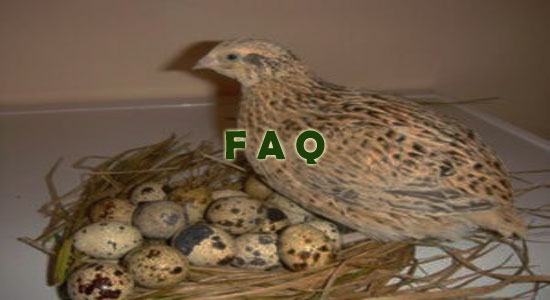
Raising Quails Frequently Asked Questions Here are 15 frequently asked questions about raising quails:Successfully raising quail requires proper housing, adequate space, a controlled environment, good nutrition, and clean water. Quail need a secure coop to protect them from predators, as well as access to outdoor space for foraging, if possible. How To Raise Quails Quail farming can be economically beneficial due to the high market demand for quail meat and eggs, relatively low start-up costs, and fast growth rates. Quail reach maturity quicker than chickens, allowing for faster returns on investment. 12 Things To Know Before You Start Raising Quails A single quail can lay between 200 to 300 eggs per year, depending on the breed and environmental conditions. They typically start laying eggs at around 6 to 8 weeks of age, making them a productive source of eggs. The optimal conditions for incubating quail eggs include a temperature of about 99.5°F (37.5°C), humidity levels of around 45-55% for the first 14 days, and increased humidity of about 65-70% for the last few days before hatching. Eggs should be turned regularly to ensure even development. Newly hatched quail chicks should be kept in a warm environment (around 95°F or 35°C), with a brooder setup that includes a heat source, bedding, and water. Provide them with a high-protein starter feed and ensure they have enough space to move and grow. Essential aspects of quail care include providing adequate food and clean water, maintaining a clean and dry living environment, monitoring their health, and ensuring they have enough space to thrive. Regular checks for signs of illness and stress are also important. The first steps to start a quail farm include researching different quail breeds, selecting appropriate housing, purchasing starter flocks or eggs, setting up feeding and watering systems, and understanding local regulations related to livestock farming. Benefits of raising quail include their smaller size, which makes them suitable for small spaces, faster growth rates, and higher egg production relative to their size. Quail are also quieter than chickens, making them a better choice for urban or suburban settings. Yes, quail can be raised in small spaces due to their compact size and low noise levels. They can be kept in cages or small enclosures, and many quail breeds thrive in confined environments, making them ideal for backyard farming. Quail eggs typically take about 17 to 18 days to hatch, depending on the species. Proper temperature and humidity levels during incubation are crucial for successful hatching. Breeding quails involves selecting healthy breeding stock, providing suitable nesting areas, and managing incubation and hatching processes. Quails can be bred in controlled environments or in outdoor enclosures. The lifecycle includes several stages: egg, chick, juvenile, and adult. Quails have a relatively short lifecycle, with eggs hatching in about 17-23 days depending on the species. Quails are generally more delicate than larger poultry and should be handled gently. Regular interaction helps with their management and care, but avoid handling them too frequently to reduce stress. Regularly clean their enclosure to manage waste and prevent buildup. Manure can be composted or used as fertilizer. Proper waste management helps maintain a healthy environment. Provide shelter that protects them from cold and wet conditions. Ensure they have access to dry bedding and monitor their health closely to prevent cold-related issues. Benefits include egg production, meat production, and the ability to raise them in smaller spaces compared to other poultry. Quails are also relatively low-maintenance and can be a profitable venture. Young quails need a warm, secure environment with access to appropriate food and water. They require special care to ensure they grow healthy and strong, including proper heat and protection from drafts. Challenges include managing their diet and health, providing adequate space and shelter, and preventing disease outbreaks. Quails also require careful monitoring due to their small size and delicate nature. Regulations may vary by location and can include guidelines for animal welfare, housing standards, and food safety. Check local and national regulations to ensure compliance with legal requirements for raising quails. "Want To Raise Healthy Quails? Get Gerard Dawn's Ebook That Will Guide You On How To Raise Healthy Profitable Quails For Meat Or Eggs, In Your Own Farm Yard Even
|
How To Raise Quail Contact Us Terms of Use Privacy Policy About Us FAQ Site Map
